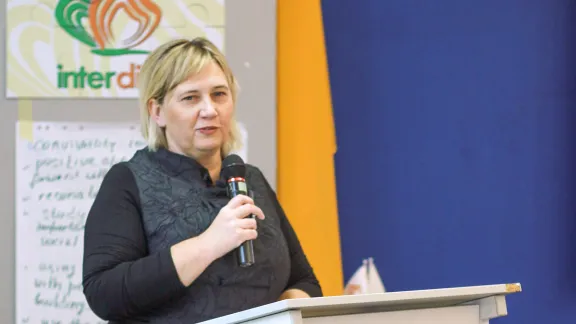
Voices from the Communion: Ms. Janka Adameová director of education diaconal program
(LWI) - Living her formative years in Slovakia, Janka Adameová learned early on that a good education was valuable, but being with people who are different because of their origin or life story was more important. Adameová, now rooted in seeking justice, is the director and co-founder of the International Academy of Diakonia and Social Action of Central and Eastern Europe (interdiac).
Interdiac is an educational agency which supports Lutheran World Federation member churches and ecumenical partners in teaching and promoting best practices for diaconal service in the region.
Adameová is a member of the Evangelical Church of the Augsburg Confession in the Slovak Republic.
Through her vocation at interdiac, Adameová integrates what she learned early in life, providing a learning environment for those who are called to care for “the least of these.” (Matthew 25)
What motivates you to work for justice?
My deep motivation is to give people a chance to receive an education. This comes from the influence of my parents and my grandparents. I remember what my grandfather told me when I was young, “School can teach you and give you a good start in life, but what is really important is to be with the people. To be with the people is a chance to discover the world.”
During the Cold War we did not have much freedom of movement but when I was 13 years old there was a change in the political regime and the world opened to me. I was offered a scholarship to study abroad with other international students. The diaconal program placed us in the homes of elderly people and among other young people who had the same call to work with marginalized people. My work with the elderly taught me about what it means to be weak and the need to ask for help. I was touched by society’s response to death and the process of dying and how important it is to accompany a person who is dying. At such a young age this influenced me greatly. This showed me how to contribute to the dignity of other people.
What is the difference between diakonia and social work?
Ten years ago, we were in discussions with partners of interdiac: diakonia agencies and the churches. We wanted to identify what makes people working in faith-based diakonia different from those employed in other kinds of social institutes. We concluded that a values-based approach is the one key that makes our work different. Therefore, it is considered in our learning programs - in addition to the knowledge and sciences that are taught to the social workers.
Being values-based means that we integrate spirituality and theology into our learning and teaching approach to diakonia. We offer devotion, prayer, and we look to the Bible. Therefore, we do not look at poverty from a cognitive level only but what does the Bible text tell us about our vocation linked to poverty. It is a spiritual reflection of the interdiac participants.
Explain the educational approach of Interdiac.
Headed by Tony Addy, interdiac’s Head of Education and co-founder, our approach to learning is rooted in ‘liberating pedagogy,’ which has its origins in the work of the Brazilian philosopher and educator Paulo Freire “Pedagogy of the Oppressed.” In the learning process we aim to ensure the active involvement and reflection of the participants, who are invited to explore further and question visible and invisible borders which undermine social cohesion and prevent social inclusion.
What are some of the injustices people face in the region?
Limited access for some nationalities seeking visas to the Czech Republic is one issue. This has impacted who we invite as guest speakers and lecturers to our workshops.
Also, low-income families, high unemployment, injustices toward the Roma people, and elderly people without families are a few.
How can churches practice diakonia?
Become sensitive to the signs of the times, fulfil the prophetic call and speak out on the behalf of those who cannot do it by themselves. Also, through witnessing the stories of marginalize people affected by the consequences of broken systems. The church should be the voice in the world and in society. The church can be the facilitator of change; to go out to the people and to the church to be more diaconal.
What is the relationship with LWF and your work?
Our cooperation with LWF started in 2011 with the first workshop in Finland on conviviality, defined as “the art and practice of living together.” We have worked together in the framework of the European Diaconal Process. Since the 2017 LWF Assembly in Namibia we have continued this process with a special focus on "People on the Move." LWF member churches from all three regions in Europe are participating in the process. We just started a new phase of cooperation in which we plan to involve local parishes’ ideas and experiences of the "seeking conviviality" process. We are planning other activities in partnership with LWF, including the creation of a new website.
By LWF/A. Gray
Video: Janka Adameová's Voice
International Academy for Diakonia and Social Action (interdiac) is based in Český Těšín, Czech Republic. The non-profit educational organization partners with the Lutheran World Federation, the Silesian Diakonia – founded by the Silesian Evangelical Church of the Augsburg Confession and receives financial support from the Evangelical Lutheran Church in America an LWF member church.
The Lutheran World Federation is a global body that shares the work and love of Christ in the world. In this series, we profile church leaders and staff as they discuss topical issues and set out ideas for building peace and justice in the world, ensuring the churches and communion grow in witness and strength.


